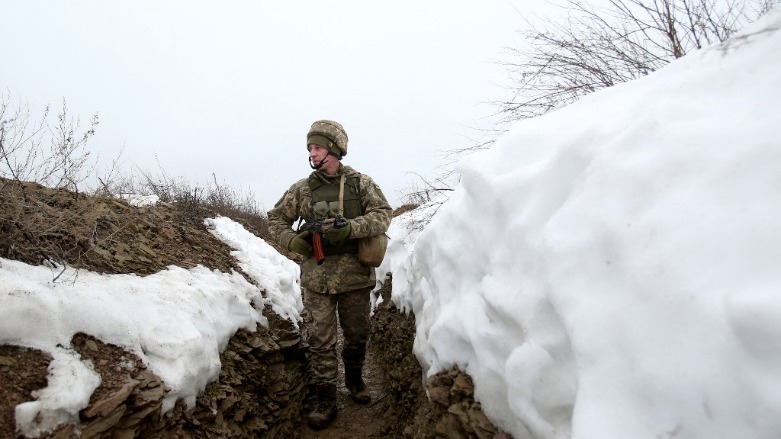US: Russia preparing ‘false flag operation’ to assault Ukraine; UK MP warns of ‘inevitable’ attack

WASHINGTON DC (Kurdistan 24) – The White House and Pentagon both warned on Friday that Moscow was preparing an operation that would—wrongly—appear to be the work of Ukraine in order to create an excuse to justify a Russian attack on its much smaller, western neighbor.
Later on Friday, Tobias Ellwood, the Conservative chairman of Britain’s parliamentary defense committee, warned, “I am afraid an invasion by Russian forces is inevitable and imminent, and we have allowed this to happen.”
“We had the opportunity to place sufficient military hardware and personnel in Ukraine to make President Putin think twice about invading,” Ellwood said, “but we failed to do so.”
Nonetheless, US officials, including Secretary of State Antony Blinken, reaffirmed on Friday that the US remained open to diplomacy to resolve the crisis.
The Biden administration seems not to comprehend that such an approach leaves the initiative to Moscow. It is up to Russian President Vladimir Putin to determine the pace and evolution of events—and if at any point, he decides not to launch a major attack on Ukraine, he will pay no price.
Rather, Putin will have benefited from his bald demonstration that NATO, Europe, and the US need to take Russian interests into account in their planning and decision-making.
US Warnings vs. Russian Threats
The US warnings followed a week of diplomatic discussions with Russia, aimed—at least on the US and European part—at easing tensions over Ukraine. However, the talks produced no concrete results.
Indeed, earlier on Friday, speaking to journalists at a press conference that he gives annually, Russian Foreign Minister Sergei Lavrov said Moscow had “run out of patience.” It was waiting for a written response to its demands that would block NATO expansion eastwards and limit its military deployments—demands inherently unacceptable to the US and other NATO members.
“If our proposals are rejected,” Lavrov warned, “we will make a decision on how to ensure our security in a reliable way.”
The US charge that Russia was preparing a false flag operation as a pretext to invade Ukraine constituted an unusually bold and dramatic statement. On Saturday, it was denounced by Russia’s state-run media, but there was little other official response from Moscow.
Since October, Russia has kept over 100,000 troops mobilized on its border with Ukraine, and the Western powers fear that Russia intends to attack.
Impending Russian False Flag Operation?
US statements about a Russian false flag operation actually began on Thursday, following the third set of diplomatic talks that week, the last of which was held in Vienna within the framework of the Organization for Security and Cooperation in Europe (OSCE.)
The OSCE includes both Ukraine and Russia. That meeting marked the first time that Ukraine was involved in the discussions to which it is central, despite repeated Biden administration reassurances, “No discussion about you, without you.”
After the OSCE talks ended, US National Security Adviser Jake Sullivan spoke to journalists. In a brief, almost passing, remark, he said, “Our intelligence community has developed information”—which the US was revealing publicly in a general, unclassified form—that “Russia is laying the groundwork to have the option of fabricating a pretext for an invasion, including though sabotage activities and information operations, by accusing Ukraine of preparing an imminent attack against Russian forces in Eastern Ukraine.”
Sullivan noted that Moscow had done something similar in 2014, when it seized Ukraine’s Crimean peninsula, and “the administration will have further details on what we see as this potential laying of a pretext to share with the press over the course of the next 24 hours.”
Indeed, the following day, on Friday, in their press briefings, White House Spokesperson Jen Psaki and Pentagon Press Secretary John Kirby both spoke about the issue.
“We have information that indicates Russia has already pre-positioned a group of operatives to conduct a false-flag operation in Eastern Ukraine,” Psaki said. “The operatives are trained in urban warfare and in using explosives to carry out acts of sabotage against Russia’s own proxy forces.”
She also described the non-lethal aspects of Russia’s influence operations, as understood by US intelligence.
“Our information also indicates that Russian influence actors are already starting to fabricate Ukrainian provocations in state and social media to justify a Russian intervention and sow divisions in Ukraine,” Psaki continued.
Kirby spoke similarly, although a bit more strongly. “We have information that indicates that Russia is already working actively to create a pretext for a potential invasion,” he said, citing both Russian operatives already positioned in eastern Ukraine, as well as “state and social media” that is being used to “try to justify in advance some sort of pretext for incursion.”
“We’ve seen this kind of thing before out of Russia,” he continued. “When there isn’t an actual crisis to suit their needs, they’ll make one up.”
On Dec. 21, Russian Defense Minister, Sergei Shoigu, in a meeting with his top military commanders, which was also attended by Putin, charged that US military contractors were smuggling into Ukraine “tanks with unidentified chemical components” in order to create a chemical “provocation,” that could be used against Russia or its Ukrainian allies.
A strong threat from Putin followed. “If the aggressive line of our Western colleagues continues,” he said, “we will take adequate military-technical response measures and react harshly to unfriendly steps,” even as the Pentagon responded immediately to Shoigu’s charge, denouncing it as “completely false.”
On Friday, Kurdistan 24 asked the Pentagon press office whether there was any relationship between Shoigu’s charge about a chemical provocation and the US warnings about Russian preparations for a false flag operation.
They declined to comment, however, beyond citing Kirby’s remarks earlier that day.
